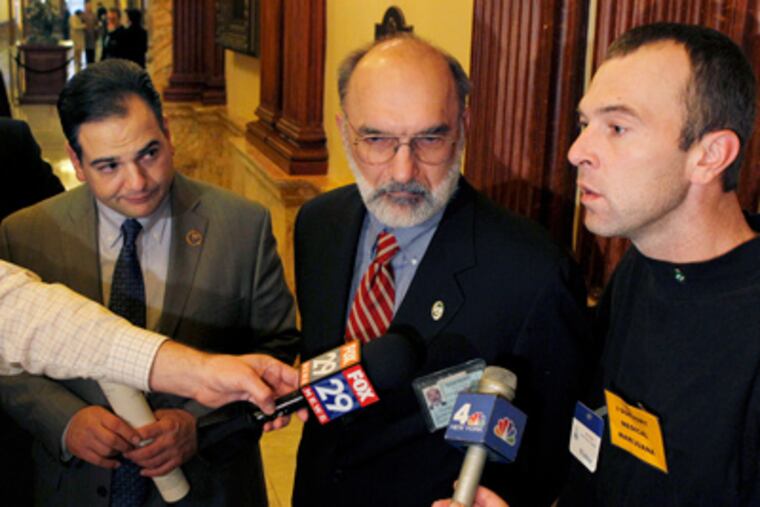New Jersey Senate votes deadline for medical-marijuana plan
The New Jersey Senate voted Monday to give state health officials 30 days to come up with a new plan for implementing the state's medical-marijuana program.

The New Jersey Senate voted Monday to give state health officials 30 days to come up with a new plan for implementing the state's medical-marijuana program.
Senators, in effect, rejected a compromise offered earlier this month by Gov. Christie, who continues to support rules more strict than the Legislature wanted.
Sen. Nick Scutari (D., Union), a sponsor of the resolution, said he hoped to meet with Christie's senior advisers to "get to the point where we can allow a functional marketplace so people that want to be in this business and people that desperately need this medicine can get together in a way that's legal and viable."
Patient advocates and sponsors of the original legislation legalizing medical marijuana, signed in January by Christie's predecessor, Gov. Jon S. Corzine, have said that rules proposed by the Department of Health and Senior Services in October would make the program unworkable.
The resolution, which passed the Senate, 22-16, highlights four areas of concern involving the potency and access to the drug.
The Assembly passed the resolution last month. But Assemblyman Reed Gusciora (D., Mercer), a sponsor, signed on to Christie's Dec. 3 proposal, which addressed two of those issues.
The governor agreed to raise the number of marijuana distribution centers statewide from four to six and to remove a requirement that terminally ill patients prove that they have exhausted other treatment options before qualifying for the program.
"In an ideal world, the governor could have gone farther," Gusciora said last week. "But I think politics is the art of compromise, and I think it was appropriate to get the program under way, rather than hold it up further."
Patient advocates say the two issues not addressed by the proposal are critical. One is a cap on the strength of the legal marijuana at a level that advocates say will fail to address patient needs and gives bureaucrats jurisdiction over an issue that should be left to doctors.
Advocates are also concerned that the list of qualifying medical conditions cannot be expanded for at least two years, according to the rules.
"I certainly hope that we have more room for compromise," Scutari said.
Christie spokesman Michael Drewniak called Scutari's push for Monday's vote "pure and simple politics." He called for Scutari, who has been advocating for medical marijuana in New Jersey for five years, to "stop the gamesmanship" and join in Christie's proposal.
The Health Department will amend the rules according to the governor's compromise and publish the revisions next month, Drewniak said.
If lawmakers are unsatisfied, the Legislature could vote to invalidate part of the original legislation or start over completely, further delaying the program.
That's something advocates don't want to see happen.
"We certainly want to bring medicine to the patients, but we can't bring half-strength medicine to patients," said Chris Goldstein of the Coalition for Medical Marijuana, referring to the cap on the strength of the drug to be sold.
Roseanne Scotti of the Drug Policy Alliance said she hoped the Christie administration moves quickly to make the additional changes.
"It's the law," she said.